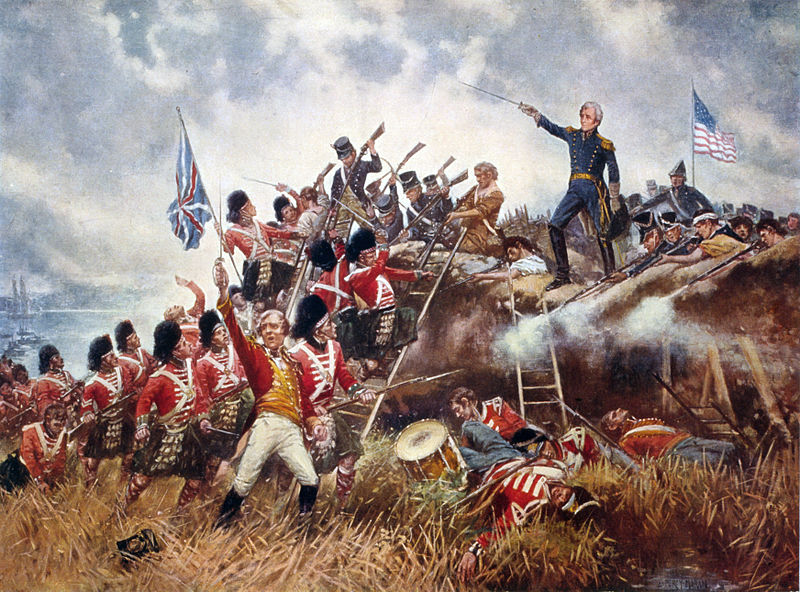Revolutionary War - Isaac Vincent
In 1772, the Vincent families and others had moved from Essex County, New Jersey, to current day Northumberland County, Pennsylvania. For several years, they lived peacefully near the local Indians. But, trouble started brewing in 1777. By 1779, about 13 families were living in a large, two-story house around which they had built a 12-foot high wall around. It enclosed a half acre and they called it Fort Freeland.
 |
| Fort Freeland (from Wikipedia) |
Life was fairly normal at the fort. Isaac Vincent's wife gave birth to a son, George, in February of 1779. Two other babies were also born at the fort. The men even planted corn in a field at the back of the fort that spring.
On July 21st, some men were working in the corn field when they were attacked by a party of Indians. Isaac Vincent, only 22 years old, was killed along with two other men. Isaac's 10-year-old brother, Benjamin, was taken captive along with another male. Their brother, Daniel Vincent, about 19-years-old, outran the captors.
About 6 hours after the attack, the captured young Benjamin was shown the scalp of his brother, Isaac, and he knew Isaac had been killed.
Eight days later, the fort was attacked by about 300 Indians and British. With only 21 men left at the fort, they quickly surrendered. Most of the remaining men were taken as prisoners and "marched" to Canada while the women, children, and "old men" were set free and walked eighteen miles to Northumberland.
Nineteen year old Daniel Vincent was my 5th great grandfather. His older brother, Isaac, lost his life at the fort. Daniel was a prisoner in Canada for three years, after which he returned home to his wife. I wrote about his story in "Prisoner of War Love Story."
My 6th great grandparents, Cornelius & Phoebe Vincent, were in their mid-forties and also at the fort. Phoebe and another woman helped to turn their plates and spoons into bullets and, as such, is a DAR eligible ancestor. Cornelius also was a prisoner in Canada for three years. After his return, "he carried ankle and wrist scars from English shackles" the rest of his life.
My 7th great grandparents, John & Elizabeth Vincent, were each about 70 years old when they were attacked at Fort Freeland. As Elizabeth was crippled, John spoke with the British and was given a horse for his wife to ride and he wasn't taken captive with the younger men.
My Vincent family suffered a great deal as they lost their son, Isaac, and the younger men were taken prisoner and not seen for three years.
Sources:
- "Warrior Run - Fort Freeland Heritage Society" webpage http://freelandfarm.org/battle-of-fort-freeland/
- "Access Genealogy: Fort Freeland, Northumberland County, Pennsylvania" webpage http://www.accessgenealogy.com/pennsylvania/fort-freeland-northumberland-county-pennsylvania.htm
- "Rootsweb: III An Account of the First White Settlement on Warrior Run" webpage http://homepages.rootsweb.ancestry.com/~banister/boyd_vincent/appendix2.htm
War of 1812 - Elkanah Anderson
Elkanah Anderson and his brother-in-law, Thomas B Whitwell, were two of my 5 times great grandfathers. In December 1814, Elkanah and Thomas joined the West Tennessee Milita and were "part of a flotila that went down to New Orleans via the Cumberland, Ohio, and Mississippi Rivers." Once there, they fought in the famous Battle of New Orleans under Andrew Jackson. During the bloody, one-sided battle which lasted only about 30 minutes on January 8th, the British suffered 2,000 casualties while the Americans only had about one hundred.
 |
| Painting of Battle of New Orleans by Edward Percy Moran (from Wikipedia) |
According to the Tennessee Archives site, there weren't any battle casualties in Elkanah's and Thomas' regiement, but there were "many deaths due to sickness" in February and March. Elkanah Anderson died on January 14th, just 6 days after the big battle. Was he one of the first to die of disease? Or did he die of battle wounds? And was he buried in an unmarked grave in New Orleans as family stories tell us?
Thomas returned home to tell his wife that her brother, Elkanah, had died in New Orleans. Elkanah's wife was presumably pregnant with their seventh child at the time of his death. Although I'm not sure exactly how he died, he died defending our young nation.
Do we share common ancestors? I'd love to talk! Please write me at drleeds@sbcglobal.net








